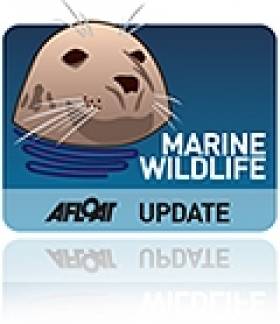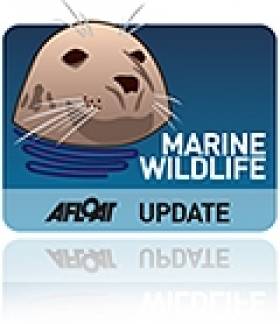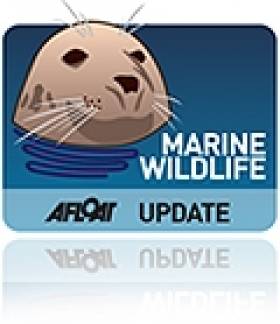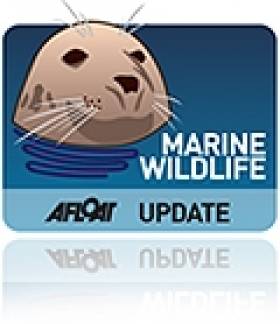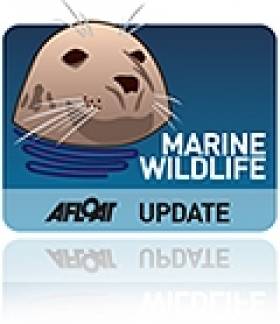Displaying items by tag: Padraig Whooley
Humpback Whales Spotted Off Kerry, Dublin Coasts
Humpback whales have already returned to Irish waters, with recent impressive sightings off Dublin and Kerry, Irish Weather Online reports.
According to the Irish Whale and Dolphin Group (IWDG), a scallop fisherman reported a 'spouting' whale near his boat last Tuesday - a sighting that was later confirmed by whale-watchers along the Dingle peninsula, who photographed two whales off Slea Head.
Meanwhile, last Thursday a third confirmed sighting was made near Lambay Island, off the Dublin coast.
"You are looking for a smallish whale, broad in shape, 25-35ft in length, with a definite 'bushy' blow, and a pronounced hump forward of the dorsal fin," said the IWDG's Pádraig Whooley.
"They are likely to be quite visible on the surface, in contrast with minke whales who rarely exhibit a visible blow and are only briefly on the surface between long dives. Humpbacks may also be curious towards boats."
Irish Weather Online has more on the story, including images, HERE.
IWDG Confirms 175 Sightings in June
The Irish Whale and Dolphin Group (IWDG) has validated 175 large marine wildlife sighting records for June 2011.
The most commonly recorded species were bottlenose dolphins, accounting for 28 per cent of all sightings, followed by harbour porpoise (25%), minke whales (13.6%), common dolphins (9%) and basking sharks (5%).
Other sightings included Risso's dolphins, killer whales, fin whales, humpback whales and pilot whales.
"This is the second consecutive year that basking shark sightings have declined, with a 36 per cent drop in sightings on the same period in 2010," said IWDG sightings co-ordinator Pádraig Whooley.
The total numbers compare with 270 sightings in June 2010. "The 35 per cent drop in sightings reflects the vagaries of Irish summers," Whooley added.
He also noted that this year marks the first time that the biggest cluster of sightings was off the coast of Co Dublin.
The IWDG has more on the story HERE.
More Whales Spotted in Irish Waters
Killer whales and a humpback whale have been spotted off the coast of Northern Ireland in recent weeks, according to the Irish Whale and Dolphin Group (IWDG).
Irish Weather Online quotes the IWDG's Pádraig Whooley, who said three killer whales - or orcas - had been seen off Rathlin Island in Co Antrim on 10 June. Two more were later spotted between the Down coast and the Isle of Man.
Then on 14 June a humpback whale was sighted off Bangor - only the third time the species has been seen in Northern Irish waters.
"Any sighting today of a humpback whale sends out a very strong conservation message," said Whooley.
Summer Whale Watching Courses on Cape Clear
The Irish Whale and Dolphin Group (IWDG) is running a new series of its popular whale watching courses on Cape Clear in Co Cork this summer.
The first weekend course from 8-10 July 2011 caters for adults keen to learn more about whales and dolphins in Irish waters and how to observe, record and identify them. It will feature a mixture of workshops and field trips, including cliff and boat-based whale watches.
Admission for this course is €70 for IWDG members (€90 for non-members). Please note that this fee does not cover transport to Cape Clear, food or accomodation, or any boat trips. As the itinerary will be weather-dependant, some flexibility will be required.
Places are also limited to 20 per course on a first-come-first-served basis. Booking requires a non-refundable deposits of €25 to be paid by cheque or postal order to the IWDG.
For bookings and enquiries contact IWDG sighting co-ordinator Pádraig Whooley at [email protected] or 023 883 8761.
Record Dolphin Strandings 'Inexplicable'
There is growing concern over the rising number of dolphin deaths along Ireland's south coast, the Irish Examiner reports.
The Irish Whale and Dolphin Group (IWDG) announced that a record 19 common dolphins washed up dead in Cork, Waterford and Wexford in January and February of this year alone - 17 more than in the same two months of last year.
Padraig Whooley of the IWDG said the deaths were "inexplicable", noting that there were no obvious signs of injury.
He added that the IWDG did not have the resources or funding to carry out the necessary post-mortems to determine the cause of death, which could be viral in nature.
The Irish Examiner has more on the story HERE.


























